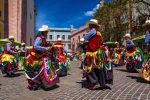Indeed, few can deny Bad Bunny’s cultural influence. His stardom has allowed him to bring the most pressing issues Puerto Rico has faced for generations to the forefront while simultaneously elevating the urban genre that is his medium of choice for his message. The historically political genre of reggaeton has long touched on the issues of gentrification, poverty and colonization. Reggaeton, like bomba and plena, is the music of choice when Puerto Ricans take to the streets in protest. The rhythmic beats of reggaeton have carried marches all the way to the capital.
It comes as no surprise then that as long as there has been reggaeton, it has seen censorship. Despite his widespread acclaim, Bad Bunny himself has been censored. Telemundo cut the audio during explicit lyrics in Bad Bunny’s televised concert in July. Bad Bunny carries on the tradition of the genre nonetheless, carrying his Puerto Rican pride with him and contributing to the acceptance of reggaeton as an important part of the growth of Latino culture.
Puerto Rican reggaeton can cover topics ranging from romance to violence. Bad Bunny’s “El Apagón” deals specifically with the chronic power outages that the island has suffered since Luma privatized the energy grid.
“El Apagón” translates to “blackout” in English, but could also be understood as “The Great Turning Off” (as one does with a light switch). With references to the infamous potholes of Puerto Rico’s narrow roads and the Puerto Rican custom for greeting loved ones, Bad Bunny paints a vivid image of life for the average Puerto Rican. One of the most poignant parts of that image comes in the sound of the power going out, a sound all too familiar to an island faced with frequent power outages. “Maldita sea, otro apagón,” is a common expression of exhausted frustration after yet another blackout. The idea of another blackout within the context of the song, while also being a faithful vignette, suggests that Puerto Rico suffers from multiple kinds of apagones.
Of course, there are apagones that are readily observable. The power system in Puerto Rico can be unreliable, sometimes making the power go out suddenly or without warning. The memory of the power plant explosion destabilizing the power system for the entire island back in April is still fresh. But there are other types of apagones represented in Bad Bunny’s video.
Blackouts shut down entire communities. Staying on the island is easier said than done as choosing to stay comes with its own set of hardships. As the final notes of the song fade away and the music video shifts to the documentary (reported by Bianca Graulau), natives of Puerta de Tierra lament the loss of their neighborhood. “They are displacing the native Puerto Rican,” they said. Forcefully removing Puerto Ricans from their native land takes the choice out of their hands and renders them powerless. The documentary’s titular apagón refers to not only blackouts caused by natural disasters, but to the lights of homes and schools that have been turned off to speed up their transformation into luxury apartments dedicated to tourist use.
Puerto Rico’s beaches could also be considered to be going through an apagón. Access to public beaches is blocked by construction or private companies that have closed off entrances, leaving a dangerous path lined with sharp, slippery rocks as the only method of entry for the general public. The resulting scarcity of Puerto Ricans on Puerto Rican beaches results in an apagón in the sense that these beaches are missing the light they once had. With fewer people on the beach bringing their radios and torches, the beaches would appear darker at night as if they too had suffered a blackout.
Yet, after every single struggle the documentary presents, it also shows the protests that arose to challenge them. In response to the displacement of property, there are the Puerta de Tierra residents stepping up to defend their neighborhood. In response to the loss of access to beaches in Dorado and Rincón, there are the protesters defending their right to access land that belongs to the people of Puerto Rico. Beats and lyrics from “El Apagón” play in the background, representing the spirit of change and progress that reggaeton carries.
Therein lies a light that never goes out and cannot be put out: the indomitable spirit of Puerto Rican strength and pride. It may be easy to lose hope when things appear so dim, but Puerto Rico is lit from the inside. No apagón can truly leave Puerto Rico in complete darkness because, as said by a Puerta de Tierra resident, the resistance will stand for as long as the heart goes on.
The lyrics of “El Apagón” allude to a duality present in Puerto Rico. The chorus chants “Puerto Rico está bien cabrón, ey, está bien cabrón.” The expression used can have a positive or negative meaning depending on its context. To say that Puerto Rico “está bien cabrón” can mean either that life in Puerto Rico is overwhelmingly amazing or overwhelmingly difficult. Other voices join with Bad Bunny’s to reflect how Puerto Ricans build a community, relating to the struggles and the joy of living on the island. Bad Bunny transitions from this chorus to verses that describe common cultural experiences that are familiar to the average Puerto Rican. The good and the bad make Puerto Rico what it is, and Bad Bunny shows the beauty of accepting both sides.
The closing lyrics embody the acceptance of Puerto Rico’s duality. Gabriela Berlingeri’s voice marks a tremendous shift in tone that contrasts with the energy in the lyrics that preceded it. Her earnest intent seeps into her somewhat melancholy melody as she unwaveringly declares that she doesn’t want to leave. Choosing to stay in Puerto Rico can be a difficult choice for many as hardships on the island have forced large migrations of people to seek better opportunities for their futures, but the very act of staying on the island represents a resilience in the Puerto Rican spirit that Bad Bunny celebrates.


















I’m only recently getting into Bad Bunny’s music, and finding out about his songs have helped me learn about what is happening in Puerto Rico. This is easily the best piece I have read about El Apagón, addressing multiple meanings and layers in his lyrics, and writing about it in such a clear way. Thank you for the wonderful read!